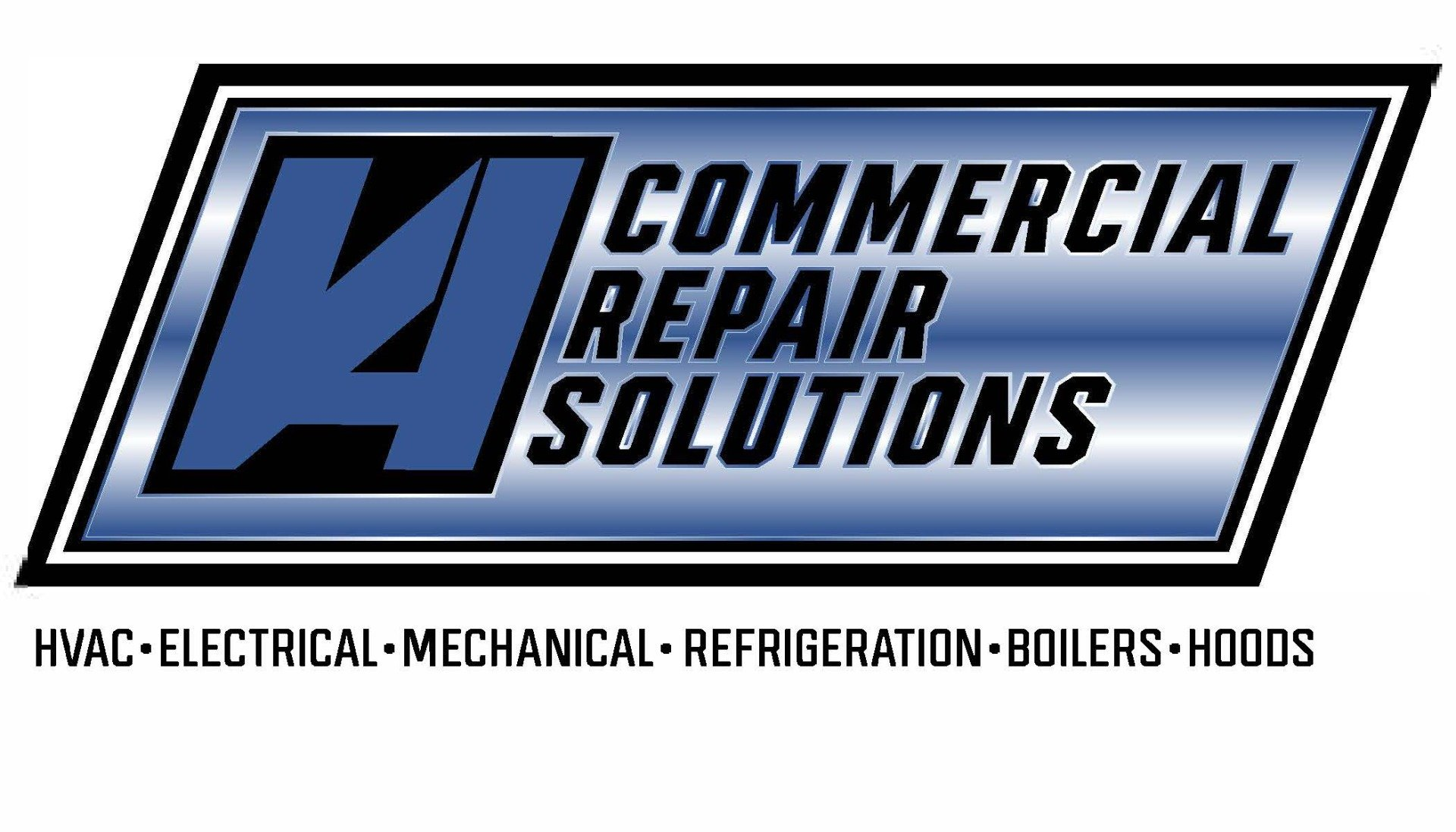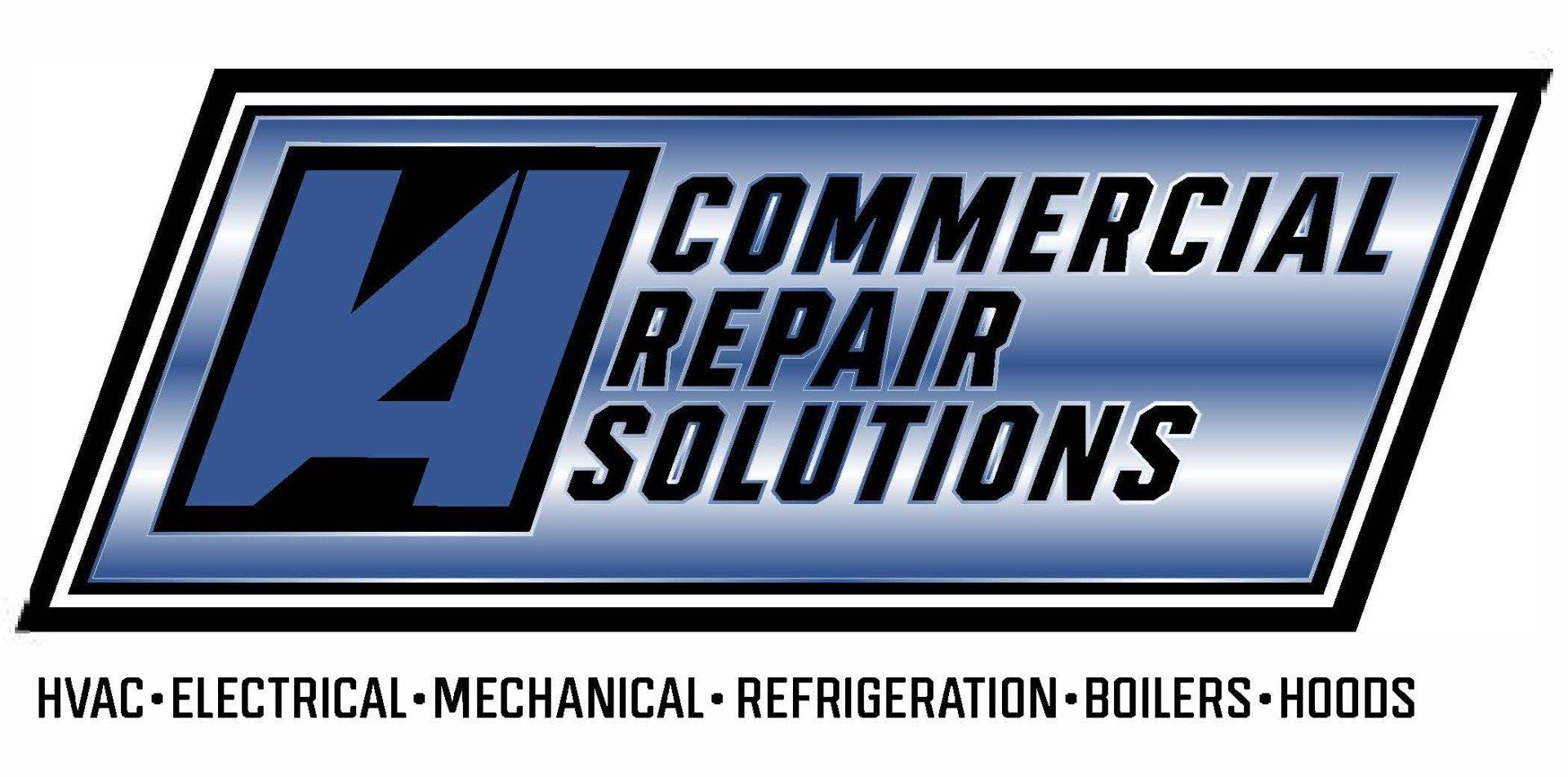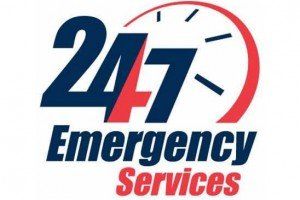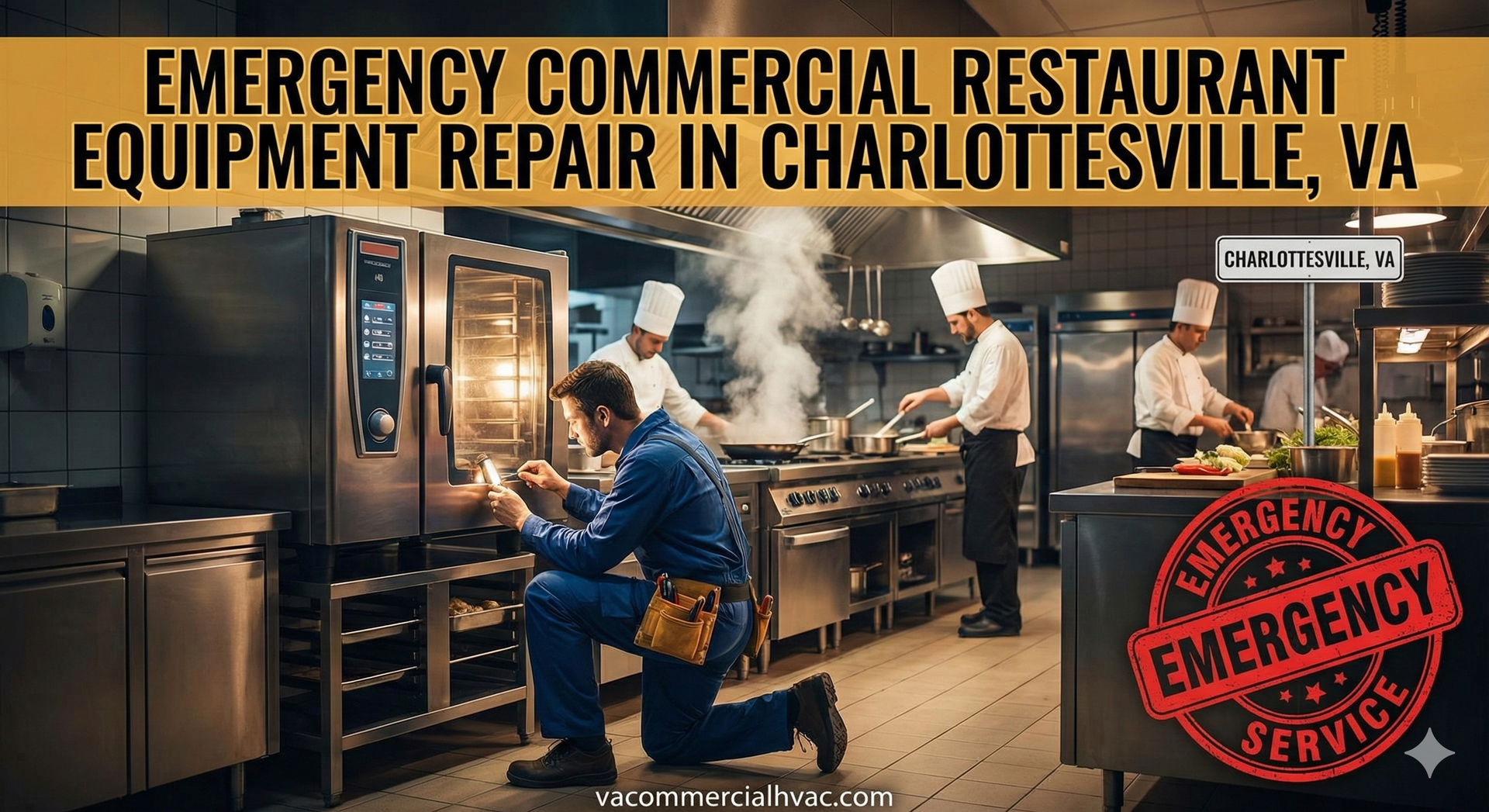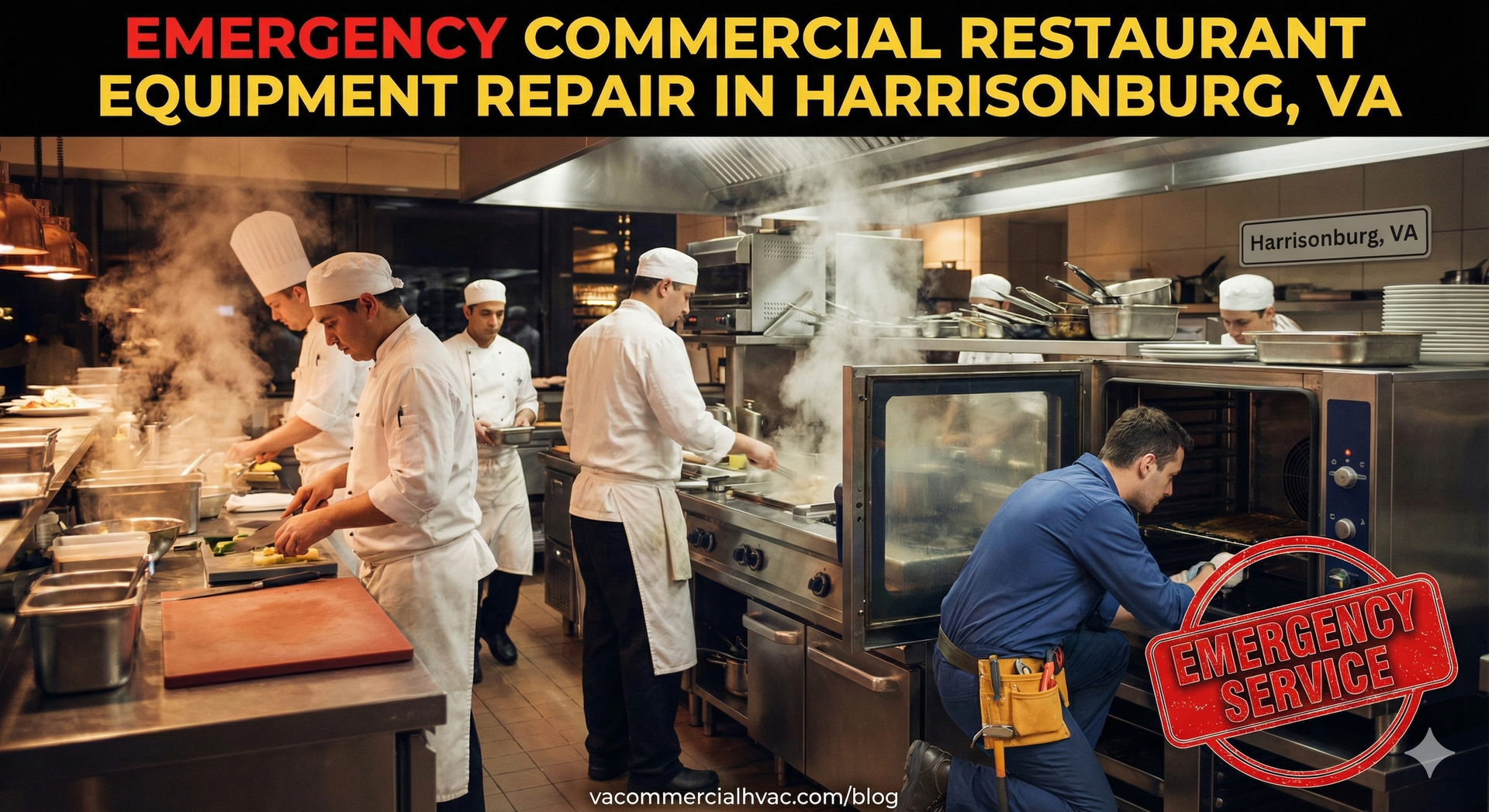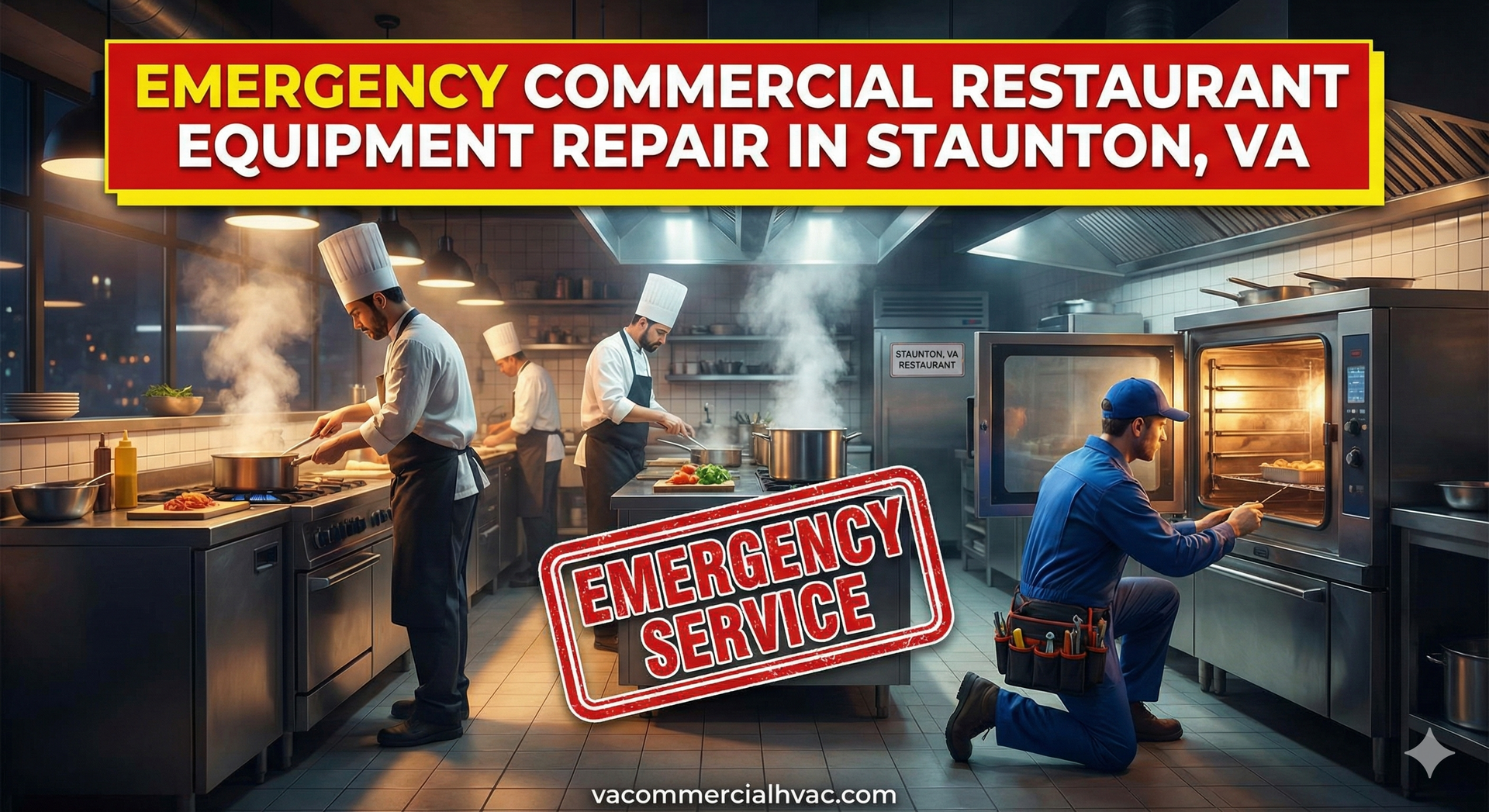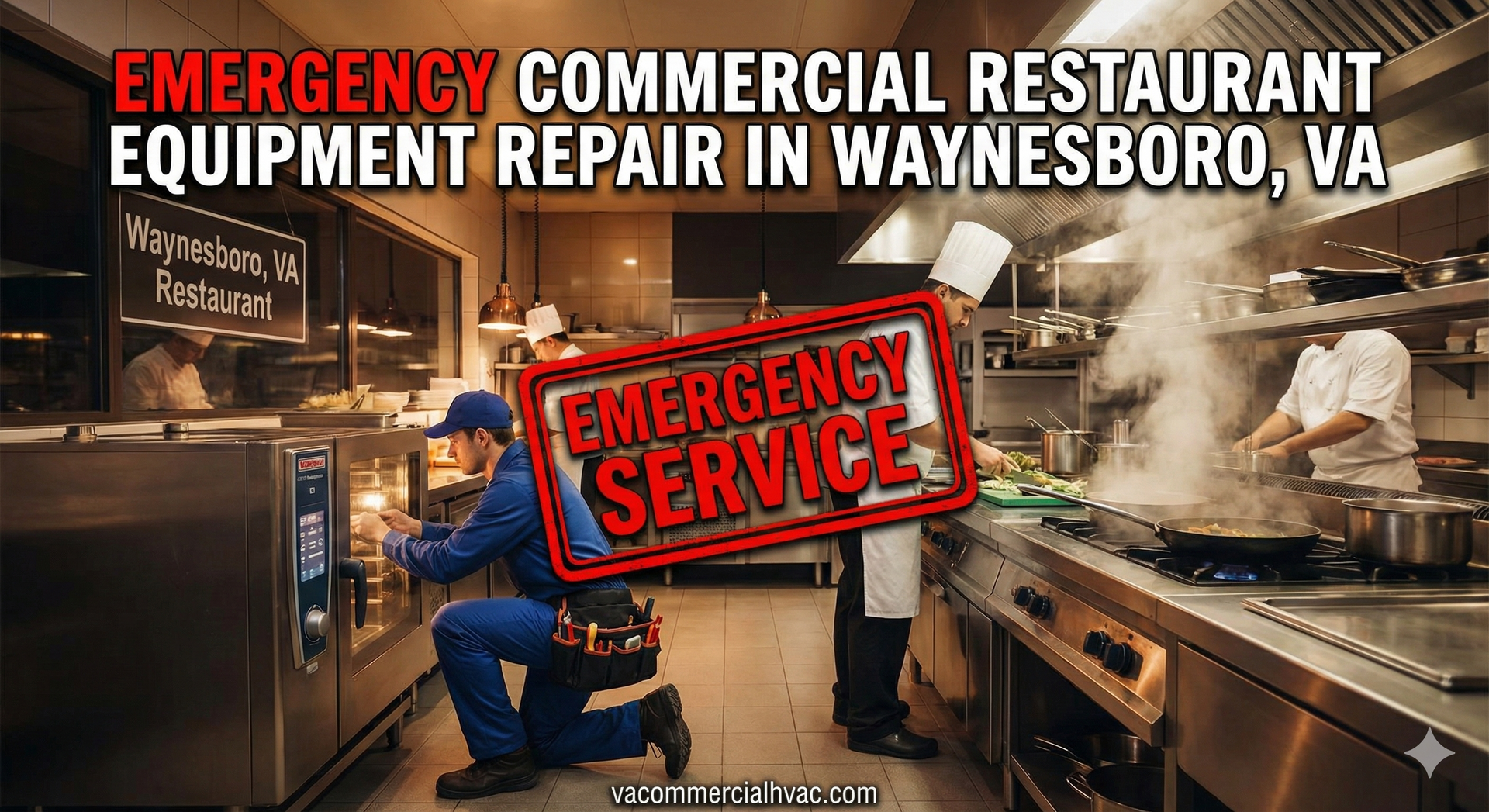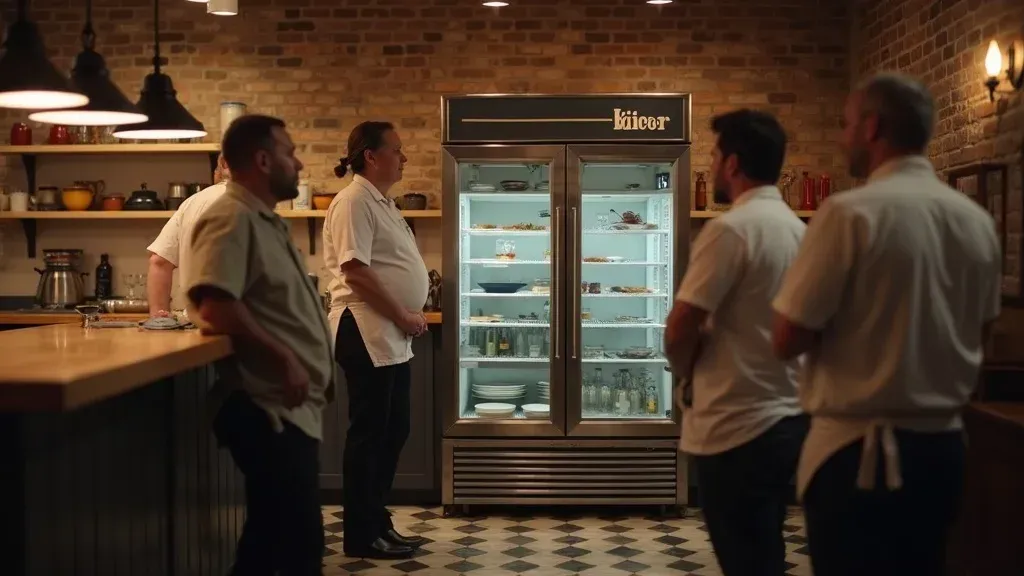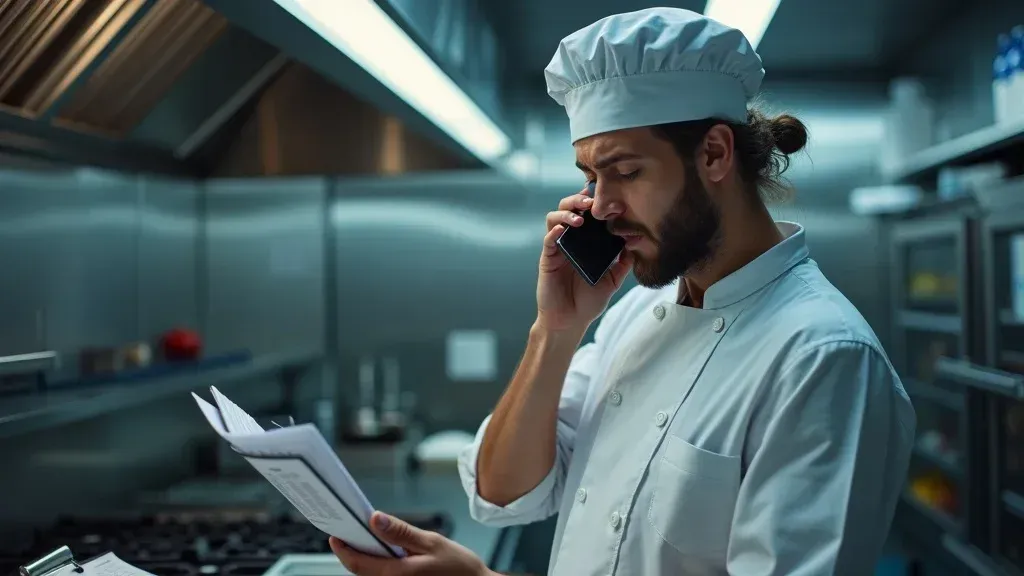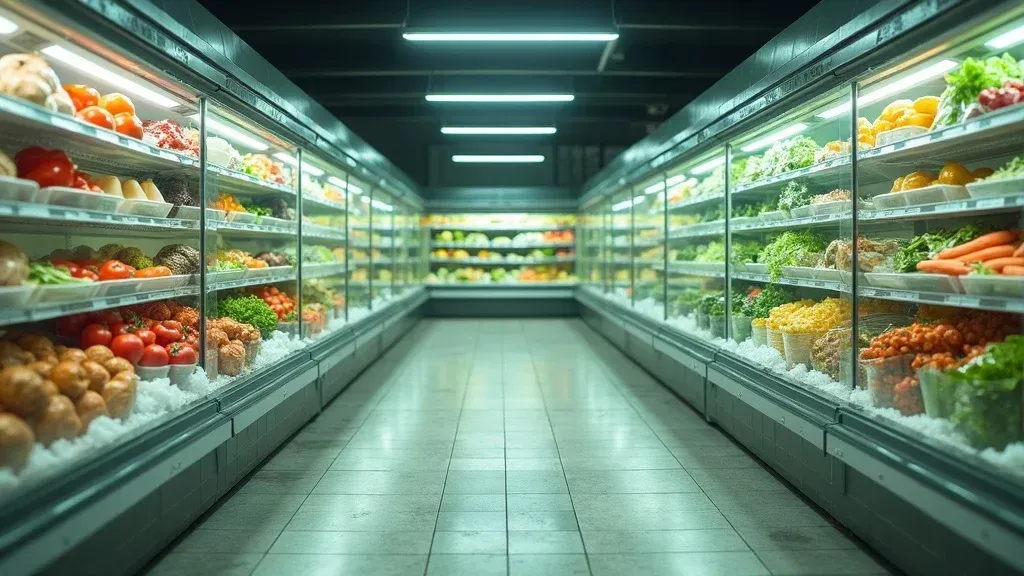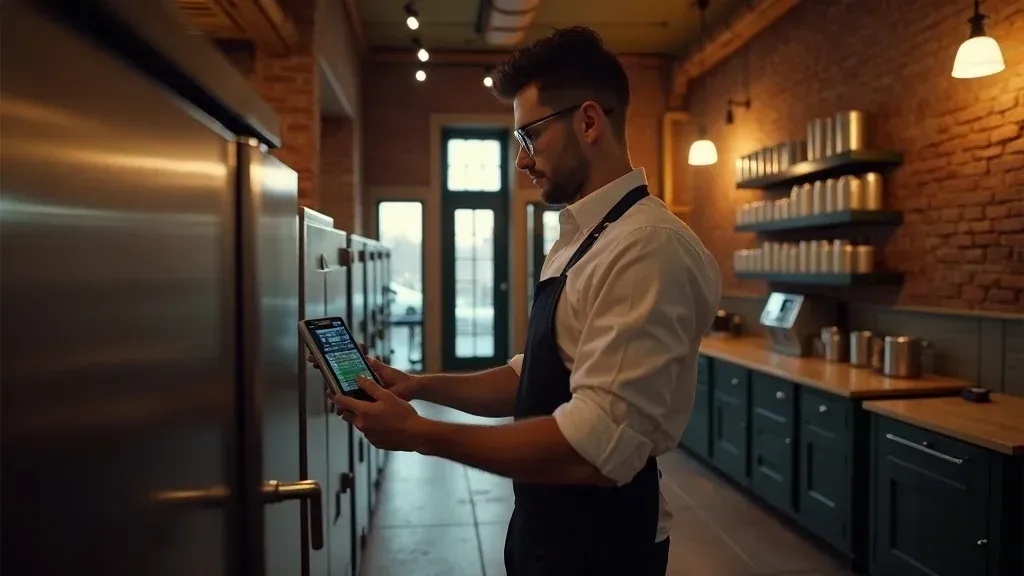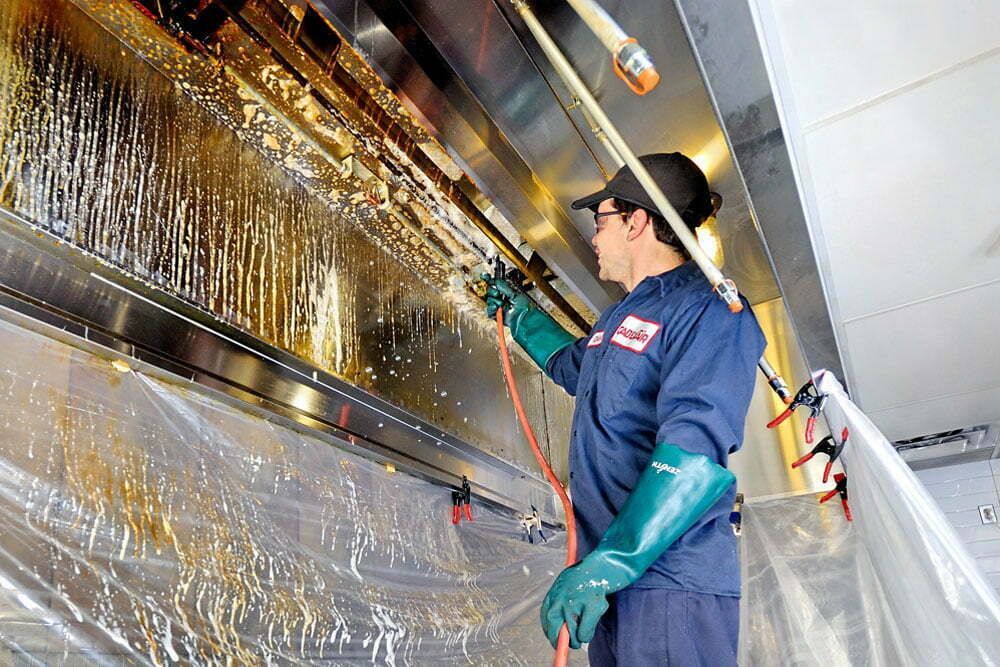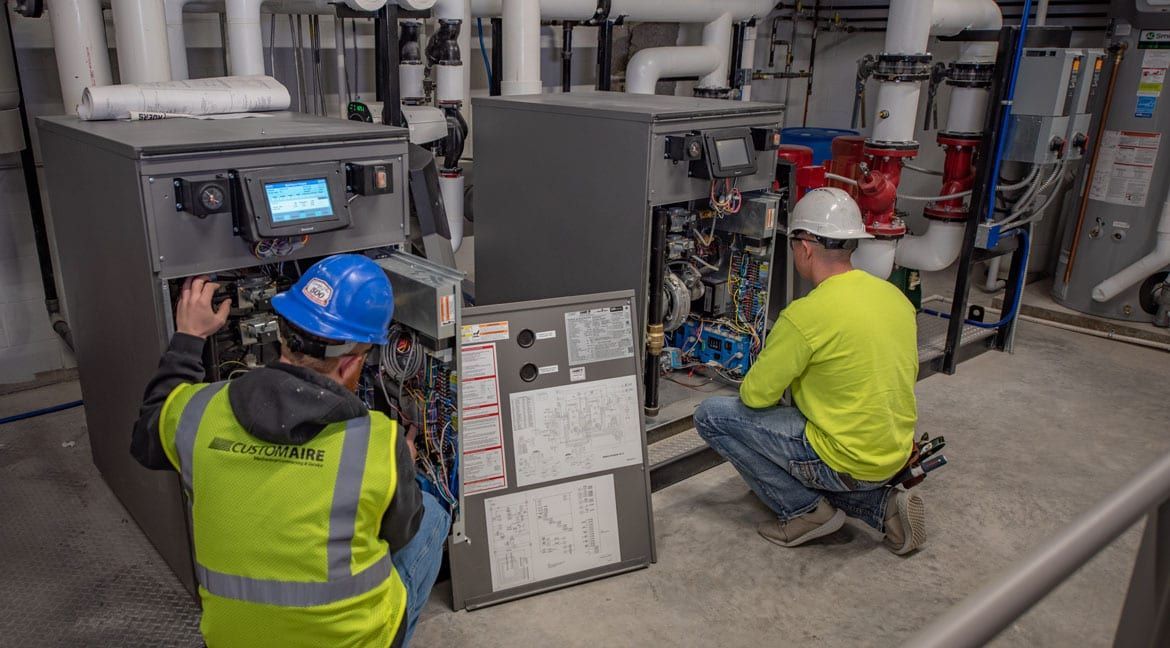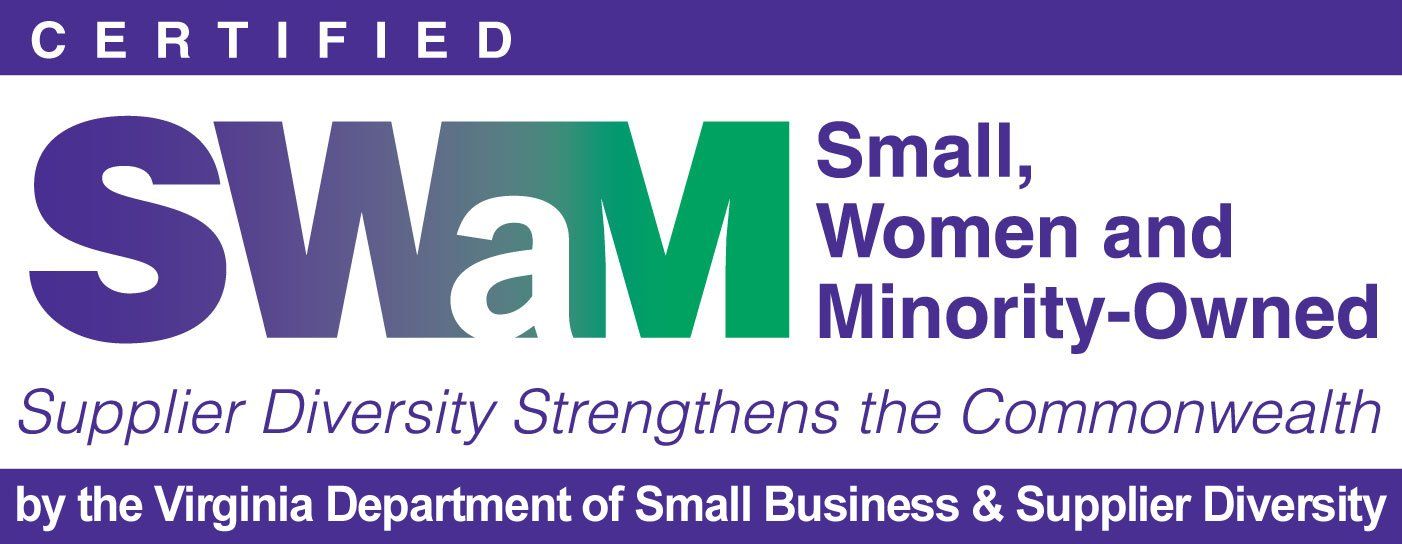Waynesboro Restaurant Hood & Exhaust Fan Compliance: A Pre-Holiday Checklist
Prepare your Waynesboro restaurant for the busy holiday season with expert exhaust hood and ventilation maintenance tips.
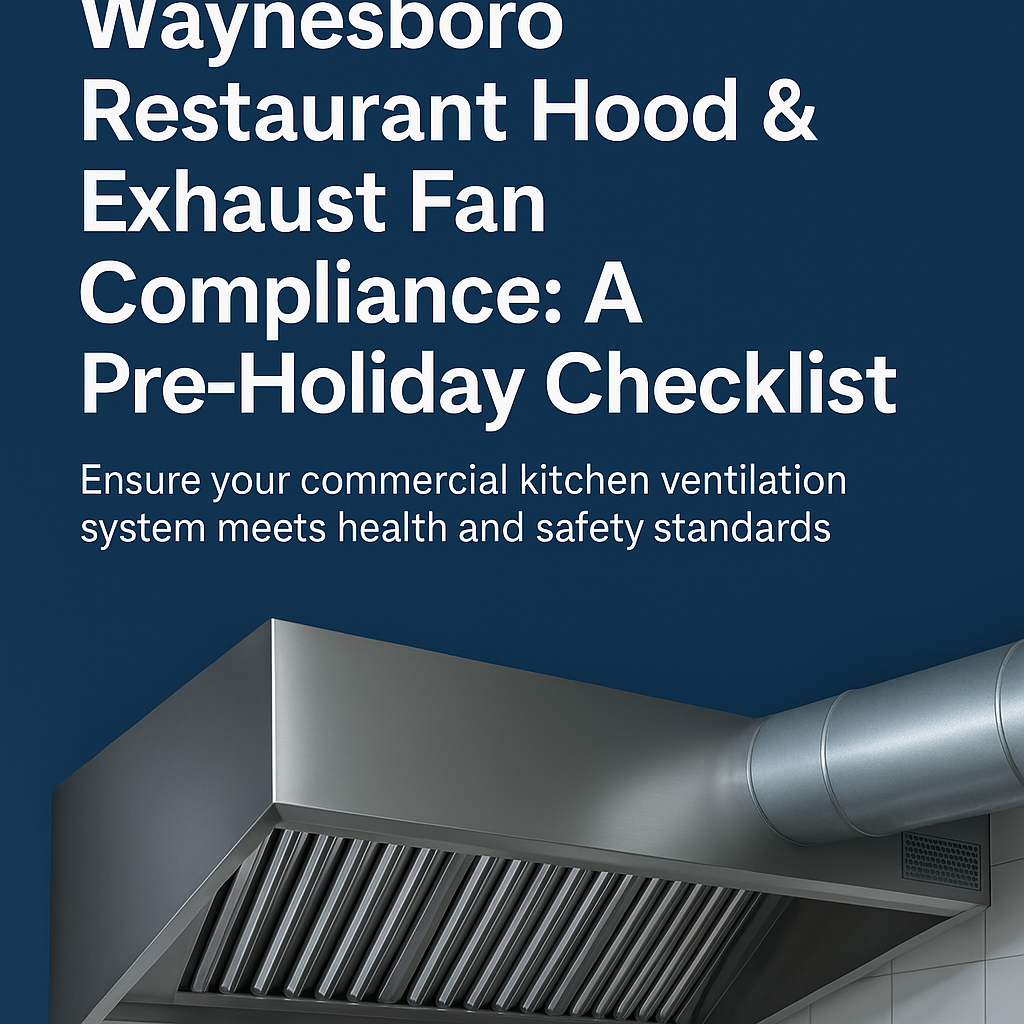
Key Takeaways
- Virginia restaurants must comply with specific health regulations (12VAC5-421) requiring hood systems that prevent grease accumulation and condensation from dripping onto food or equipment.
- The holiday season puts additional strain on kitchen ventilation systems, making November the critical time to address compliance issues before potential emergency shutdowns.
- A comprehensive hood inspection should include filter assessment, grease buildup evaluation, fan operation, ductwork integrity, and fire suppression system verification.
- VA Commercial Repair Solutions specializes in commercial kitchen hood installations and can ensure your system meets both performance and regulatory requirements in Waynesboro.
- Non-compliant exhaust systems can lead to fines, business closure, insurance premium increases, and significant revenue loss during the busiest season of the year.
Is your restaurant's kitchen ventilation system ready for the holiday rush? As Waynesboro kitchens prepare for increased service volumes and longer operating hours, your hood and exhaust systems will face unprecedented stress. One small ventilation issue can quickly escalate into a code violation that shuts down your entire operation during the most profitable time of year. VA Commercial Repair Solutions has seen countless restaurants scramble last-minute to address compliance issues that could have been prevented with proper planning.
The holiday season brings extended hours, more cooking stations in full swing, and hotter kitchen temperatures—all pushing your ventilation system to its limits. What might be a minor issue during slower months can quickly become a major compliance problem when your equipment is operating at maximum capacity. Now is the critical time to ensure your hood system meets all Waynesboro and Virginia state requirements.
Article-at-a-Glance
This guide walks you through the essential components of restaurant exhaust compliance in Waynesboro, providing a comprehensive pre-holiday checklist to keep your kitchen operational during the busiest season. We'll cover the critical regulations, inspection points, maintenance schedules, and emergency protocols that every restaurant owner needs to implement before the November rush begins.
Holiday Kitchen Fire Risks: Why Hood Compliance Matters Now
The statistics are sobering: restaurant fires spike by nearly 25% during November and December. With kitchen lines running at full capacity and staff working longer hours, the risk factors multiply dramatically. Your exhaust system serves as your primary defense against grease fires—but only if it's properly maintained and compliant with regulations.
When a hood system fails to capture grease and heat effectively, the consequences extend far beyond just a code violation. Grease accumulation becomes a serious fire hazard, especially when exposed to the high-volume cooking typical of holiday service. A properly functioning exhaust system not only ensures compliance but also reduces HVAC stress, cuts cleaning labor, and helps avoid emergency downtime precisely when you can least afford it.
The increased cooking volume during holidays means more grease-laden vapors need to be efficiently captured and exhausted. Systems that performed adequately during regular service periods may suddenly fail to keep up, allowing grease and condensation to collect on walls, ceilings, and equipment—all direct violations of Virginia Food Regulations that can trigger immediate shutdown orders during routine inspections.
Critical Virginia Regulations for Restaurant Hood Systems
Understanding the regulatory framework is essential for maintaining compliance. Virginia restaurants operate under multiple overlapping requirements that govern kitchen ventilation systems.
Virginia Health Department Requirements (12VAC5-421)
The Virginia Department of Health enforces specific regulations that directly impact your kitchen exhaust system. Section 12 VAC 5-421-1480 requires that "Ventilation hood systems and devices shall be sufficient in number and capacity to prevent grease or condensation from collecting on walls or ceilings." This seemingly simple requirement has significant operational implications.
Additionally, Section 12 VAC 5-421-1210 specifies that exhaust hood systems must be designed to prevent grease or condensation from draining onto food, equipment, utensils, linens, or single-service articles. These requirements aren't just bureaucratic red tape—they're designed to prevent contamination and fire hazards in your kitchen.
When Virginia health inspectors evaluate your hood system, they're looking for evidence of compliance with these specific regulations. A properly designed and maintained system should effectively capture and remove cooking vapors, preventing the buildup of grease and condensation throughout your kitchen space. Failure to meet these requirements can result in citations, penalties, or even temporary closure.
Fire Code Compliance Standards
Beyond health department regulations, Waynesboro restaurants must comply with fire safety codes, particularly NFPA 96 (Standard for Ventilation Control and Fire Protection of Commercial Cooking Operations). These standards establish minimum requirements for the design, installation, operation, and maintenance of your exhaust system to reduce the potential fire hazard.
Fire code compliance includes proper installation and maintenance of automatic fire suppression systems within your hood. These systems must be inspected and tagged every six months by a certified technician, with documentation kept on-site for fire marshal review. Many restaurant owners don't realize that expired fire suppression tags can result in immediate shutdown during routine inspections.
Waynesboro-Specific Permit Requirements
Local regulations add another layer of compliance requirements. In Waynesboro, the installation or modification of commercial kitchen ventilation systems falls under the Virginia Uniform Statewide Building Code (VUSBC) as implemented by city authorities. Any significant changes to your exhaust system require proper permits and inspections from local officials.
When planning system upgrades or modifications, working with contractors familiar with Waynesboro's specific requirements can save significant time and prevent costly compliance issues. Local authorities will verify that your system meets both state regulations and any city-specific requirements before allowing operation.
10-Point Pre-Holiday Exhaust System Inspection
Before the holiday rush begins, a thorough inspection of your entire exhaust system is essential. This comprehensive assessment should evaluate all components from hood to roof termination point. As the holiday season approaches, restaurants in Waynesboro are gearing up for heavier service volume.
1. Hood Filter Condition Assessment
The first line of defense in your exhaust system is your hood filters. These should be examined for warping, corrosion, or improper fit that could compromise grease capture efficiency. Bent or damaged filters can significantly reduce the system's effectiveness and create compliance issues. Replace any filters showing signs of wear or damage, and ensure you have backup filters on hand for the busy season.
2. Grease Buildup Evaluation
Examine the entire hood interior, plenum area, and accessible ductwork for grease accumulation. Even a seemingly small amount of grease buildup can indicate insufficient cleaning practices or system performance issues. Pay special attention to horizontal runs of ductwork where grease is more likely to accumulate. If substantial buildup is found, schedule an immediate professional cleaning before the holiday season begins.
3. Exhaust Fan Operation Check
Fan performance is critical to system function. Check for unusual noises, vibration, or reduced airflow that might indicate bearing failure or belt issues. Ensure the fan activates properly when cooking equipment is in use and that automatic shutdown features engage correctly when triggered. Fan failure during peak service can quickly lead to kitchen shutdown and significant revenue loss.
4. Ductwork Integrity Inspection
Examine all accessible ductwork for leaks, corrosion, or separation at joints. These issues not only compromise system efficiency but can also allow grease to escape into building cavities, creating serious fire hazards. Look for grease stains on the exterior of ductwork, which indicate potential leakage points that require immediate attention.
5. Fire Suppression System Verification
Verify that your fire suppression system has current inspection tags and that all nozzles are properly positioned over cooking equipment. Check that the manual pull station is unobstructed and properly located near an exit path. Ensure all staff members understand emergency procedures related to system activation. Remember that suppression systems must be professionally inspected every six months to maintain compliance.
- Maintenance Schedule to Implement Before November
Implementing a structured maintenance schedule is crucial for maintaining compliance and preventing system failures during the high-volume holiday season. This proactive approach allows you to address small issues before they become operational emergencies.
The intensity of your maintenance schedule should align with your cooking volume and type. Restaurants with heavy frying operations or solid-fuel cooking equipment require more frequent attention than those with lighter cooking methods.
Daily Tasks for Kitchen Staff
Daily maintenance forms the foundation of your compliance strategy. Train kitchen staff to wipe down hood surfaces after each shift, check for grease accumulation, and report any unusual conditions like water dripping from the hood or decreased airflow. Staff should also inspect filters daily, removing and cleaning them according to manufacturer specifications when grease buildup is evident. This consistent attention prevents the gradual degradation that leads to compliance failures.
Weekly Manager Inspections
Managers should conduct more thorough weekly inspections that go beyond surface cleaning. These inspections should include checking fan operation, examining ductwork connections, and ensuring fire suppression pull stations remain unobstructed.
Weekly Manager Inspection Checklist
- Verify all hood filters are clean and properly seated
- Check exhaust fan for unusual noises or vibration
- Confirm make-up air systems are functioning properly
- Inspect fire suppression system tags for currency
- Verify maintenance logs are current and accessible for inspectors
- Test emergency shutdown procedures
Documentation of these weekly inspections provides crucial evidence of compliance efforts. Keep detailed records in a dedicated binder, including dates, findings, and any corrective actions taken. Health inspectors often review these records during their visits.
Weekly inspections also provide an opportunity to verify that emergency procedures are fresh in staff members' minds. Randomly quiz employees on the location of manual pull stations and proper evacuation procedures to ensure readiness for potential emergencies.
Monthly Professional Cleaning Requirements
Monthly professional cleaning of accessible hood system components is essential for compliance with Virginia regulations. These cleanings should be performed by trained professionals who understand the specific requirements of commercial kitchen exhaust systems. The cleaning must include the hood, filters, plenum, and accessible portions of the ductwork. After cleaning, request detailed documentation showing which components were cleaned, cleaning methods used, and any issues identified that require further attention.
Quarterly Deep Clean Protocol
Quarterly deep cleaning addresses the entire exhaust system from hood to roof termination point. This comprehensive service requires specialized equipment and trained technicians who can access and clean all components. According to NFPA 96 standards, the frequency of these cleanings may need to be increased based on cooking volume and type—high-volume frying operations may require monthly deep cleaning, while solid-fuel cooking typically requires quarterly service. The cleaning company should provide detailed documentation and before/after photos to verify compliance with regulations.
Real Costs of Non-Compliance During Peak Season
The financial implications of exhaust system non-compliance extend far beyond simple repair costs. When violations occur during the busy holiday season, the impact can be devastating to your bottom line and reputation.
Financial Impact of Emergency Shutdowns
An emergency shutdown during peak season can cost a mid-sized Waynesboro restaurant between $2,000 and $5,000 per day in lost revenue. With health inspectors making more frequent visits during high-volume periods, the risk of a surprise inspection revealing compliance issues increases substantially. The holiday season often represents 30-40% of annual revenue for restaurants, making a multi-day closure particularly devastating.
Beyond immediate revenue loss, emergency repairs typically cost 2-3 times more than scheduled maintenance. Emergency service calls during holidays often incur premium rates, and the urgency to reopen can lead to rushed, less optimal solutions. Planning ahead with scheduled maintenance and addressing minor issues before they escalate is significantly more cost-effective.
Insurance Premium Increases After Violations
Insurance companies view code violations and especially fire-related incidents as major red flags. A single fire code violation related to your exhaust system can trigger premium increases of 15-25% upon renewal. Multiple violations or an actual fire incident can lead to policy cancellation or exclusions that leave your business financially vulnerable.
Most restaurant insurance policies require compliance with local codes and manufacturer specifications as a condition of coverage. When non-compliance is discovered after an incident, insurers may deny claims entirely, leaving restaurant owners personally liable for damages. This risk amplifies during the holiday season when systems are under maximum stress.
Legal Liability Risks
The liability implications of non-compliant exhaust systems extend beyond regulatory penalties. Restaurant owners can face personal liability for injuries or damages resulting from fires or other incidents caused by improperly maintained systems. These liability risks extend to customers, employees, neighboring businesses, and property owners.
In the event of a fire determined to be caused by improper maintenance or non-compliance, lawsuits can target personal assets beyond business insurance limits. Courts have consistently held restaurant owners personally liable when negligence in system maintenance can be demonstrated. The financial and reputational damage from such incidents can permanently shutter even established restaurants.
Emergency Response Plan for System Failures
Even with meticulous maintenance, emergencies can occur. Having a comprehensive response plan in place before the holiday rush begins is essential for minimizing downtime and financial impact
.
Warning Signs That Require Immediate Action
Train your staff to recognize warning signs that demand immediate attention. Excessive smoke in the kitchen, grease dripping from hood seams, unusual odors from the exhaust system, or visible flames require immediate shutdown and emergency response. Other less obvious signs include diminished airflow, excessive condensation on walls or ceilings, or unusually hot exterior hood surfaces.
Consistently tracking system performance allows you to identify gradual degradation before catastrophic failure occurs. Staff should report any changes in system noise, vibration patterns, or exhaust effectiveness immediately. Addressing these early warning signs before the holiday rush can prevent emergency situations during your busiest service periods.
Who to Call When Systems Fail
Establish relationships with qualified service providers before emergencies occur. Create an emergency contact list that includes your regular hood cleaning service, mechanical contractor, fire suppression system provider, and insurance agent. Keep this list prominently posted in the kitchen along with your system's make, model, and installation date information to expedite emergency service.
Consider establishing service agreements with priority response guarantees, particularly during holiday seasons when service providers are in high demand. These agreements typically provide faster response times and can include preferred customer pricing for emergency services. The small premium paid for such agreements is minimal compared to extended closure costs during your busiest season.
Temporary Solutions While Awaiting Repairs
If your system experiences partial failure during peak season, temporary measures may allow limited operations while awaiting repairs. In some cases, health authorities may permit reduced cooking operations with temporary ventilation solutions, provided the fire suppression system remains functional. Always contact your local health department before implementing temporary measures to ensure continued compliance.
Working With Waynesboro Contractors: What to Expect
Selecting the right contractor for your exhaust system needs is critical for ensuring both compliance and operational reliability. Local contractors who understand Waynesboro's specific requirements and inspection patterns offer significant advantages over general service providers. VA Commercial Repair Solutions specializes in navigating local compliance standards while delivering optimal system performance for restaurants throughout the region. As the holiday season approaches, restaurants in Waynesboro are gearing up for heavier service volumes.
Questions to Ask Before Hiring
When vetting potential contractors, ask specific questions about their experience with restaurant exhaust systems in Waynesboro. Request references from other local restaurants they've serviced, particularly those with similar cooking operations and volume. Verify they have proper licensing, insurance, and certifications for hood system work, including fire suppression system certification if applicable.
Discuss their familiarity with local health department expectations and recent inspection trends. Contractors who regularly work with Waynesboro restaurants can provide insights into common compliance issues and how to address them efficiently. Ask about their emergency response capabilities during holidays and whether they offer service agreements with priority scheduling for regular customers.
Understanding typical service timeframes helps you plan maintenance to minimize operational disruption. Schedule comprehensive system servicing at least 3-4 weeks before the holiday rush begins to allow adequate time for any unexpected repairs or parts procurement. Most contractors experience significantly higher demand from November through December, often resulting in scheduling delays of 50-100% compared to off-peak periods.
When scheduling service, ask about after-hours options that might minimize disruption to your operations. Many contractors offer premium rates for overnight servicing that allows restaurants to maintain normal business hours. While these services typically cost 25-50% more, they can be more economical than lost business during daytime closures.
For major system upgrades or replacements, start planning at least 8-12 weeks before the holiday season. These projects require significant lead time for engineering, permitting, equipment procurement, and installation. Rushing major projects to beat the holiday deadline often results in higher costs and potential compliance issues.
Documentation You Need for Inspections
Maintaining comprehensive documentation is essential for demonstrating compliance during health and fire inspections. Create a dedicated compliance binder containing service records, cleaning logs, inspection certificates, and equipment specifications.
Include photographs of cleaned components with dated timestamps as additional verification of maintenance activities. This documentation should be readily accessible to both management and inspectors.
Your Holiday Season Survival Guide
As November approaches, implement this final checklist to ensure your exhaust system remains compliant through the busy holiday season. This proactive approach helps prevent costly disruptions during your most profitable period while protecting your staff, customers, and business investment.
Start by scheduling a comprehensive system inspection at least four weeks before your anticipated holiday rush begins. This timing allows for identification and correction of any issues before inspectors make their seasonal rounds. Pay particular attention to components that experience accelerated wear during high-volume periods, such as fan bearings, belt tensions, and filter frames.
- Schedule professional hood cleaning 1-2 weeks before Thanksgiving
- Verify fire suppression system inspection is current and will remain valid through January
- Stock extra filters to enable immediate replacement during peak periods
- Train seasonal staff on daily hood maintenance procedures
- Update emergency contact information and response procedures
- Review insurance coverage to verify compliance requirements are met
- Document pre-holiday system condition with photographs and inspection reports
Remember that prevention is always less expensive and disruptive than emergency response. The modest investment in proactive maintenance before the holiday season delivers substantial returns through uninterrupted operations during your highest-revenue period.
Frequently Asked Questions
Restaurant owners consistently raise certain questions about exhaust system compliance as the holiday season approaches. These frequently asked questions address common concerns and provide practical guidance for maintaining operations during your busiest period.
The answers below reflect current Virginia regulations and Waynesboro-specific requirements as of this publication. Always verify requirements with local authorities, as codes and enforcement priorities may evolve over time.
For situation-specific guidance, consult with qualified contractors familiar with local requirements and your particular system configuration. What works for one restaurant may not be appropriate or compliant for another due to differences in cooking operations, equipment types, and facility layout.
How often should restaurant hood filters be cleaned during the holiday season?
During the holiday season when cooking volumes increase substantially, hood filters should be cleaned at minimum every 2-3 days for high-volume operations. Restaurants with extensive frying or solid-fuel cooking may require daily filter cleaning to maintain compliance and system efficiency. The best practice is to establish a rotating cleaning schedule where a portion of filters are cleaned daily, ensuring the entire system receives regular attention without disrupting operations.
Visual inspection should guide your cleaning frequency—when filters show visible grease accumulation or when airflow appears diminished, immediate cleaning is necessary regardless of the calendar schedule. Keep multiple sets of filters on hand during peak seasons to allow immediate replacement while soiled filters are being cleaned.
Can I perform hood system maintenance myself or do I need a certified professional?
While daily surface cleaning and filter maintenance can and should be performed by properly trained staff, Virginia regulations require professional cleaning for the internal components of your exhaust system. Professional hood cleaning companies have specialized equipment, training, and certification to properly clean ductwork, fans, and fire suppression components. Additionally, certified professionals provide documentation of service that satisfies both health department and fire code requirements—documentation that self-cleaning cannot provide.
What's the minimum fire suppression system inspection schedule required by Virginia law?
Virginia follows NFPA 96 standards which require semi-annual inspection and certification of kitchen fire suppression systems by qualified technicians. These inspections must be performed at intervals not exceeding six months, with documentation tags affixed to the system. The inspection must verify proper nozzle placement, linkage function, fuel/power shutoff integration, and agent container pressure/weight.
During the holiday season, verify that your current certification will remain valid through January. If your certification expires during the peak season, schedule recertification before the holiday rush begins to avoid potential shutdown during a surprise inspection. Keep copies of inspection reports in your compliance documentation binder.
How much downtime should I plan for when scheduling a complete hood system cleaning?
A thorough hood system cleaning typically requires 4-6 hours for an average restaurant kitchen, though larger or more complex systems may require 8-12 hours. Most professional cleaning services can perform this work overnight to minimize operational disruption. For planning purposes, schedule cleanings on slower business days or between meal service periods if overnight service isn't available.
The cleaning process includes disassembly of filters and accessible components, application of specialized degreasers, pressure washing or steam cleaning of surfaces, and reassembly of the system. Technicians will need full access to your cooking line, so equipment may need to be moved or protected during the process.
For particularly dirty systems or those that haven't been professionally cleaned in over six months, allow additional time for thorough cleaning. Systems with extensive grease buildup may require multiple cleaning sessions to restore proper function and compliance.
Hood Cleaning Planning Timeline
- Schedule cleaning: 2-3 weeks in advance during holiday season
- Pre-cleaning prep: Staff clears cooking line and surrounding areas
- Professional cleaning: 4-12 hours depending on system size and condition
- Post-cleaning inspection: 30 minutes to verify system reassembly
- Documentation review: 15 minutes to confirm proper certification
Are there tax benefits to upgrading exhaust systems before year-end?
Yes, substantial tax advantages may be available for exhaust system upgrades completed before December 31st. Section 179 of the tax code allows businesses to deduct the full purchase price of qualifying equipment purchased or financed during the tax year, up to certain limits. This can include exhaust system components that improve efficiency, safety, or compliance. Consult with your tax professional about potential deductions for necessary upgrades.
Beyond direct tax benefits, upgraded systems often deliver operational cost savings through improved energy efficiency, reduced maintenance requirements, and decreased fire insurance premiums. Modern systems with variable-speed fans and automated controls can reduce energy consumption by 30-50% compared to older continuous-operation systems.
When considering year-end upgrades, focus on components that deliver both compliance improvements and operational benefits. For example, replacing an aging exhaust fan with a more efficient model can improve capture effectiveness while reducing energy costs and maintenance frequency.
VA Commercial Repair Solutions provides comprehensive commercial kitchen ventilation services throughout Waynesboro and the surrounding region, ensuring your restaurant remains compliant and operational through the critical holiday season and beyond.
